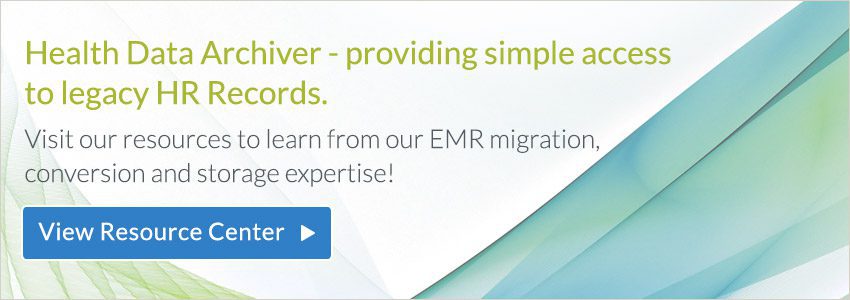
by Fria Kurowski, Account Manager and Privacy & Security Officer at Harmony Healthcare IT
If given the chance, I’m not so sure I would trade in my 25+ years of working with ERP software. The challenge of implementing technology to manage such large volumes of critical information at a variety of organizations has been one I’ve thoroughly welcomed and enjoyed. While I’m still immersed in data day-to-day, I’m now working the flipside of the ERP life-cycle: application retirement and HR record retention. My most recent career focus is to help healthcare organizations develop a strategy for ERP data migration and archival so that systems like Lawson, Kronos, or API Healthcare can be decommissioned. While retiring ERP applications brings with it a number of strategic considerations and the occasional data hurdle, the ERP retirement benefits for the organization far outweigh the effort.
ERP System Replacement: Conversion vs. Archival
I hear various reasons for why one ERP system is being replaced by another, but one question remains constant: “what will we do with our legacy data?” With years or even decades worth of critical workforce data in the breach, the development of an ERP data migration strategy is a must for healthcare organizations to comply with business record retention requirements. One of the first decisions to be made is whether data should be converted into the new ERP or migrated off to an easily accessible archive. As full system data conversion for volumes of human resource, supply chain, financial and enterprise performance management data are often too costly and complex, ERP data migration and archival has proven to deliver both a return on investment, user satisfaction for long-term access and HR record retention.
Considerations for ERP Data Migration to an Archive
When it comes right down to it, data is data. So, whether we’re archiving vendor purchasing history/transactions, benefits history, W2 detail or time and attendance records from Lawson, Kronos or API Healthcare; the methodology is the same. Here are some considerations when approaching an ERP data migration project:
- Find an archive solution that will preserve immutable ERP data and scanned images in a secure environment for years to come
- Ensure that the data is easily accessible by users, categorized by topic, searchable by multiple data points (i.e., name, date of birth, social security number, employee ID) and capable of being sorted and filtered
- Consider converting only “master file” data to your new ERP software system. Inventory, Vendor, and Employee master files are typically straight-forward to import into your new system, saving you time and money.
- Ponder the possibility of using an archive solution for your historical transactions rather than attempting to convert them into the new software system. While most vendors would promise you how easy it is to convert transaction history, the reality is that each ERP system stores those differently and it’s typically not worth the time, money or aggravation to take them to your new ERP system.
- Eliminate the need for users to “remember” how to navigate an old Lawson, Kronos or API Healthcare system over the years for which records must be retained by making certain that multiple legacy data domains (i.e., HR, General Ledger, Accounts Payable, EHR, practice management) and multiple legacy data sources (i.e., Lawson, CPSI, McKesson, Mysis Tiger) can be consolidated into a single archive
The Benefits of ERP Application Retirement
As I’ve transitioned into the healthcare segment, I find that hospitals tend to just keep old software up and running! With so many electronic health record issues and government mandates competing for attention from IT, system retirement seems to simmer on the back burner as a low priority. My public service announcement to healthcare CIOs nationwide is this: it doesn’t take that much effort! If you partner with the right vendor, you’ll find that much of the heavy lifting for ERP data extraction, migration, validation and archival is handled. The bottom line is that the benefits far outweigh the efforts, freeing up time and space for your IT team to optimize its EHR and focus on more pressing active data issues.
 Fria Kurowski, Account Manager and Privacy & Security Officer
Fria Kurowski, Account Manager and Privacy & Security Officer
Fria is an Account Manager and Privacy & Security Officer for Harmony Healthcare IT. She has spent over 25 years working with Enterprise Resource Planning (ERP) software and is leveraging that expertise to work with hospital and health systems clients decommissioning ERP as well as other clinical and financial systems. She is responsible for the policies and procedures that protect the confidentiality, integrity, and availability of HHIT information systems and protected health information.
Editors Note: This blog contains content from an earlier blog post on September 4th, 2015.







